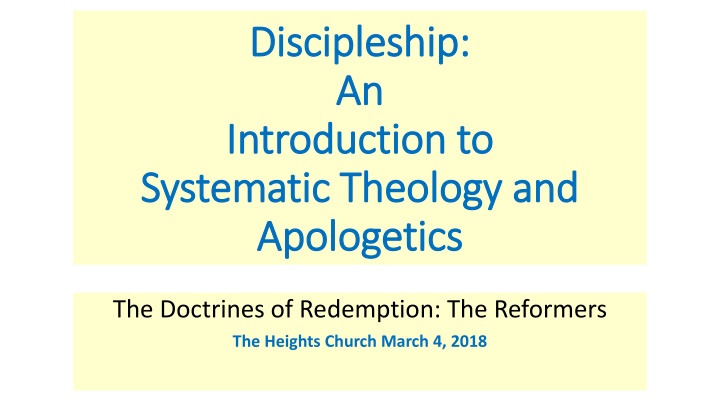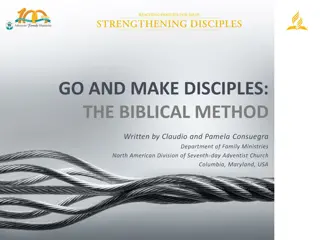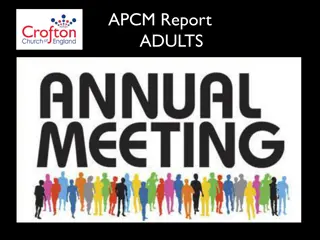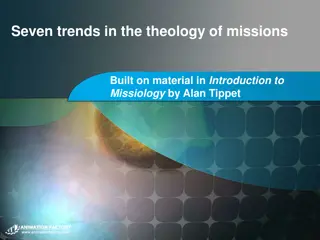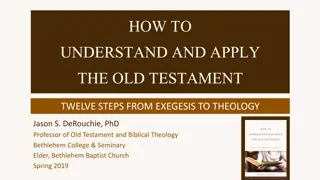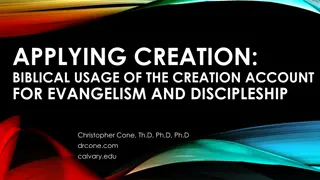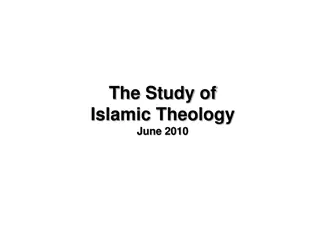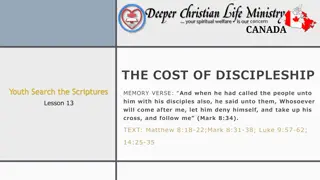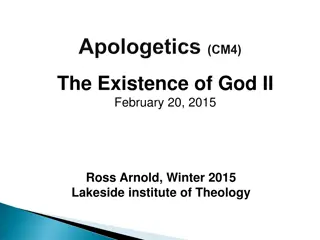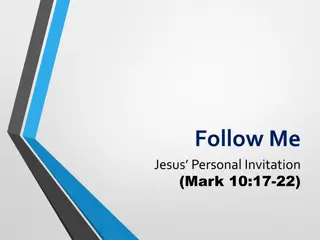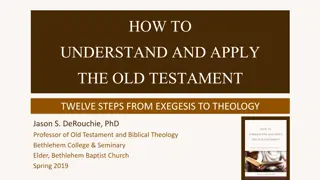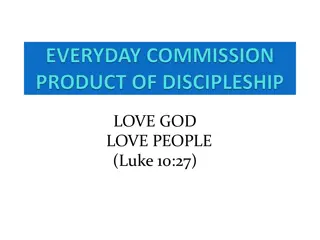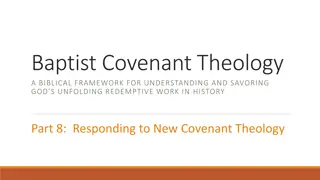Discipleship: An Introduction to Systematic Theology and Apologetics
Delve into the doctrines of redemption, explored by the reformers. Learn about Lent, Mardi Gras, and the significance of Purim in the Jewish calendar. Discover key events from The Reformation, including insights on John Calvin's impact.
Download Presentation

Please find below an Image/Link to download the presentation.
The content on the website is provided AS IS for your information and personal use only. It may not be sold, licensed, or shared on other websites without obtaining consent from the author.If you encounter any issues during the download, it is possible that the publisher has removed the file from their server.
You are allowed to download the files provided on this website for personal or commercial use, subject to the condition that they are used lawfully. All files are the property of their respective owners.
The content on the website is provided AS IS for your information and personal use only. It may not be sold, licensed, or shared on other websites without obtaining consent from the author.
E N D
Presentation Transcript
Discipleship: Discipleship: An An Introduction to Introduction to Systematic Theology and Systematic Theology and Apologetics Apologetics The Doctrines of Redemption: The Reformers The Heights Church March 4, 2018
Modern Jewish Holidays Purim (Wednesday February 28, 2018) Purim is not a required holiday in the Torah. There is no single agreed upon explanation for the origin of Purim. Purim is celebrated on the 14th day of the Hebrew month of Adar or Adar II in Leap Years. It honors the deliverance of the Jews through the efforts of Queen Esther. The Book of Esther is read in synagogues. It is a day to give charity to anyone who reaches out their hand. For many today Purim is a holiday for practical jokes and noisy fun and eating jam-filled, three-cornered pastries reminding Jews how their nemesis, Haman, received his just desserts. People often dress in costumes depicting the characters in the story. It is sometimes called the Jewish Halloween.
Lent Lent comes from the Anglo Saxon word lencten, which means "spring. Pre Easter fasting was present as early as the 2ndcentury. In 325, the Council of Nicea discussed a 40-day Lenten season of fasting, but it's unclear whether its original intent was just for new Christians preparing for Baptism. Its purpose has always been the same: self-examination and penitence, demonstrated by self-denial, in preparation for Easter. Until the 600s, Lent began on Sunday, but Pope Gregory I (c.540-604) moved it to a Wednesday, now called Ash Wednesday, to secure the exact number of 40 days in Lent not counting Sundays, which were feast days. As Christians came to the church for forgiveness, Gregory I marked their foreheads with ashes reminding them of the biblical symbol of repentance (sackcloth and ashes) and mortality: By the 800s, Christians were allowed to eat after 3 p.m. By the 1400s, it was noon. Eventually, various foods (like fish) were allowed, and in 1966 the Roman Catholic church only restricted fast days to Ash Wednesday and Good Friday.
Mardi Gras The Mardi Gras season actually begins on Epiphany, a Christian holiday celebrated on January 6 that is otherwise known as Three Kings Day or the Twelfth Day of Christmas. Mardi Gras literally means Fat Tuesday in French. Traditionally, rich foods such as eggs, meat, oils and butter were strictly prohibited during the 40 days of Lent. It thus became customary to eat all that remained of these foods in the house and enjoy one last feast on the day before the 40-day fast. The first American Mardi Gras took place on March 3, 1699, when French explorers landed in what is now Louisiana, just south of the holiday's future epicenter of New Orleans.
The Reformation The Reformation John Calvin July 10, 1509 John Calvin July 10, 1509 May 27, 1564 May 27, 1564 Meanwhile in Geneva church attendance was down and Rome invited Geneva to return to the Catholic faith. No one in Geneva was able to respond to Rome so they asked Calvin and he wrote the response! September 21, 1540 the Geneva council decided to recall Calvin. They tracked him down at aconference to settle religious disputes, in Worms. His response was, "Rather would I submit to death a hundred times than to that cross on which I had to perish daily a thousand times over. By mid-1541, Strasbourg decided to lend Calvin to Geneva for six months. Calvin returned on September 13, 1541 with an official escort and a wagon for his family. Historians debate the extent to which Geneva became a theocracy. On the one hand, Calvin's theology clearly called for separation between church and state but enormous political power was wielded on a daily basis by the clerics. By November 20, 1541. The Geneva council had passed ordinances suggested by Calvin that defined four orders of ministerial function: pastors to preach and to administer the sacraments; doctors to instruct believers in the faith; elders to provide discipline; and deacons to care for the poor and needy.
The Reformation The Reformation John Calvin July 10, 1509 John Calvin July 10, 1509 May 27, 1564 May 27, 1564 Calvin recognized the power of music and in 1542 adapted a service book (Hymnal) he used in Strasbourg to support scripture readings. In 1542 he also wrote a Geneva catechism, dropping the catechism he used during his first stay based on Luther s Large Catechism. An ecclesiastical court composed of the lay elders and the ministers was established. The city government retained the power to summon persons before the court, and the court could judge only ecclesiastical matters having no civil jurisdiction. The court could mete out sentences, up to excommunication. The government contested this power and on March 19, 1543 the council decided that all sentencing would be carried out by the government. Voltaire wrote about Calvin, Luther and Zwingli, "If they condemned celibacy in the priests, and opened the gates of the convents, it was only to turn all society into a convent. However, the system worked so well for so many years that when John Knox visited Geneva in 1554, he wrote a friend that the city "is the most perfect school of Christ that ever was in the earth since the days of the apostles.
The Reformation The Reformation John Calvin July 10, 1509 John Calvin July 10, 1509 May 27, 1564 May 27, 1564 Calvin preached over two thousand sermons in Geneva. He preached twice on Sunday and three times during the week. In late in 1542 the council allowed him to preach only once on Sunday. In October 1549, he was again required to preach twice on Sundays and, in addition, every weekday of alternate weeks. His sermons lasted more than an hour and he did not use notes. An occasional secretary tried to record his sermons, but very little of his preaching was preserved before 1549. In 1549, a professional scribe began using a system of shorthand to record all of Calvin's sermons. An analysis of his sermons suggests that Calvin was a consistent preacher and his style changed very little over the years. He was also known for his thorough manner of working his way through the Bible in consecutive sermons. From March 1555 to July 1556, Calvin delivered two hundred sermons on Deuteronomy!
The Reformation The Reformation John Calvin July 10, 1509 John Calvin July 10, 1509 May 27, 1564 May 27, 1564 By 1546 Libertines (liberal members of the wealthy class) in Geneva began to oppose Calvin. The council straddled both sides of the conflict, alternately admonishing and upholding Calvin. After some losses before the council, Calvin believed he was defeated. On July 24, 1553 he asked the council to allow him to resign. Although the libertines controlled the council, his request was refused. The opposition realized that they could curb Calvin's authority, but they did not have enough power to banish him. On August 3, 1553 Michael Servetus a Spanish physician and Protestant theologian who was a fugitive from ecclesiastical authorities for boldly criticizing the doctrine of the Trinity and paedobaptism (infant baptism) arrived in Geneva. In 1546 Servetus and Calvin had exchanged about 30 letters with both writing under assumed names. Calvin finally cut off the exchange when Servetus sent him a copy of the Institutes marked with abundant negative comments. Calvin wrote to Servetus, "I neither hate you nor despise you; nor do I wish to persecute you; but I would be as hard as iron when I behold you insulting sound doctrine with so great audacity."
The Reformation The Reformation John Calvin July 10, 1509 John Calvin July 10, 1509 May 27, 1564 May 27, 1564 At one point Servetus had mentioned that he would come to Geneva. Calvin wrote a letter to Farel on February 13, 1546 that if Servetus were to come, he would not assure him safe conduct: "for if he came, as far as my authority goes, I would not let him leave alive. In 1553 Calvin learned Servetus was hiding in Vienne France and alerted the French authorities. Servetus was captured but managed to escape from prison, and the Catholic authorities sentenced him in absentia to death by slow burning. Servetus was put on trial but Geneva wanted the opinions of churches in other cities. On October 20 the replies from Zurich, Basel, Bern, and Schaffhausen were read and the council condemned Servetus as a heretic. On October 21 he was sentenced to burning at the stake, the same sentence as in Vienne. Some scholars claim that Calvin and other ministers asked that he be beheaded instead of burned, knowing that burning at the stake was the only legal recourse. This plea was refused and on October 27, Servetus was burned alive. After the death of Servetus, Calvin was acclaimed a defender of Christianity. In February 1555 elections were held in Geneva. By then, many of the French refugees had been granted citizenship and with their support, Calvin s supporters regained control of the council.
The Reformation The Reformation John Calvin July 10, 1509 John Calvin July 10, 1509 May 27, 1564 May 27, 1564 Calvin's authority was practically uncontested during his final years, and he enjoyed an international reputation as a reformer distinct from Martin Luther. Calvin s turned his attention to the creation of a College, in Geneva. It opened June 5, 1559. Although the school was a single institution, it was divided into two parts: a grammar school called the coll ge and an advanced school called the acad mie. Within five years there were 1,200 students in the grammar school and 300 in the advanced school. The coll ge eventually became the Coll ge Calvin, one of the college preparatory schools of Geneva; the acad mie became the University of Geneva. He also attempted to reform France. At least 100 ministers were sent from Geneva to start protestant churches in France. However, the French government severely persecuted protestants and the effort failed. When Calvin died his body lay in state, but so many people came that the reformers were afraid that they would be accused of fostering a new saint's cult. He was buried in an unmarked grave. A stone was added in the 19th century to mark a grave traditionally thought to be Calvin s.
The Reformation The Reformation John Calvin July 10, 1509 John Calvin July 10, 1509 May 27, 1564 While Luther is credited with starting the reformation, Calvin had the most significant influence on Protestantism. By the end of his life he became the leading voice in the wider Reformed world as it began to develop in Scotland, England, France, and the Netherlands. Much of his influence comes down to two major factors: the clarity of his writing and the translation of the Institutes into other languages, especially English. Calvin s articulation of reformed theology not only resulted in church bodies named "Presbyterian" or "Reformed" (including many Baptist groups) and the Puritans, but the Arminian churches as well because they arose out of their objections to reformed theology. Outside the church, his ideas have been blamed for and credited with (depending on your view) the rise of capitalism, individualism, and democracy. The late 20thcentury saw a resurgence in Calvinism. In its March 12, 2009 issue Time Magazine listed what it called the New Calvinism as one of 10 Ideas Changing the World Right Now. Quoting Ted Olsen, managing editor at Christianity Today, they said, "everyone knows where the energy and the passion are in the Evangelical world with the pioneering new-Calvinist John Piper of Minneapolis, Seattle's pugnacious Mark Driscoll and Albert Mohler, head of the Southern Seminary of the huge Southern Baptist Convention. May 27, 1564
